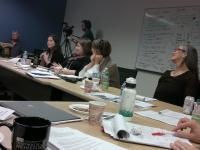In late January, the IPinCH Working Group on Customary, Convention and Vernacular Legal Forms hosted a two-day Workshop, “Transforming Colonial Categories? Customary Law, Legal Pluralism and the Cultural Heritage of Indigenous Peoples,” at York University. Over the course of two days, graduate students and scholars from Canada and the United States gathered to consider the meaning of customary law and its relationship, both in theory and in practice, to legal pluralism, cultural heritage and intellectual property rights.
The first day of the event was devoted to a Graduate Student Workshop, which opened with a thought-provoking keynote address delivered by Dr. Haidy Geismar of New York University who discussed her recent work on IP disputes in indigenous communities in Vanuatu and Atorea. Arguing that customary law challenges the way in which culture is mapped onto property relations, Dr. Geismar set the tone for the Workshop by questioning the firm distinction between customary law and “official law.” She argued that the processes of reification and objectification, often assumed to take place when customary practices are subsumed by “official law,” do not signal the end of customary practice; rather, she suggested that these processes are often the beginning of generative legal practices that draw strategically on both customary copyright law and official legal mechanisms.
Continuing in the spirit of Dr. Geismar's opening address, the rest of the morning session was filled with innovative and insightful student presentations that took seriously the relationship between cultural practices and customary law. Often drawing connections between these concepts and notions of citizenship, the conditions of neoliberalism and the recognition of indigenous sovereignty, the papers given addressed a wide range of related topics such as the relationship between settler states and indigenous cultural producers, indigenous collaborative research practices, and the challenges arising in reconciling Indigenous and Canadian institutional ethical and legal frameworks.
The Graduate Student Workshop also included an interactive workshop session lead by Dr. Catherine Bell, a member of the IPinCH Steering Committee. This focused specifically on legal pluralism in the context of collaborative policy development and academic research practices with Indigenous communities, and what this mean in terms of such topics as the Tri-Council guidelines for conducting ethical research, Indigenous laws and protocols, grant transfer agreements, consent forms for ethnographic work, control over data and archives, First Nation research protocols.
The energy of from the Graduate Student Workshop continued to build on the second day of the event with dynamic faculty presentations on topics that ranged from the need for effective indigenous legal pedagogy, the consideration of what the terms “obligation” and “honor” might mean in the context of indigenous and crown relationships, to a questioning of what happens when the law rests on imaginative geographies and specific cultural narratives of victimhood as a means of issue mobilization. These presentations, among others, generated much discussion and debate on the definitions of legal pluralism and customary law, the place of cultural heritage practices within alternative legal orders, and the question of how intellectual property rights may be reconciled with issues of indigenous sovereignty and governance.
The workshop concluded with a strategy meeting where the participants of the conference agreed to continue the conversation through the CCVF Working Group in order to develop further initiatives related to this topic.
Portions of the event were filmed and short clips should soon be available on the IPinCh website.
The programs for the Graduate Workshop and for the main faculty workshop are attached.






